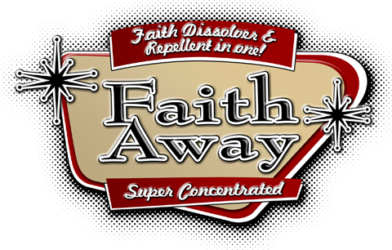Let’s examine the benefits of religious belief that believers are afraid of losing when they contemplate giving up their faith, and let’s look at whether these benefits are in any way tied to the truth of their beliefs, especially the supernatural beliefs. And let’s identify which of these benefits, can still be achieved by secular means
1. a sense of community.
This is something that every church or religious group offers that we all find very compelling, the feeling that as part of the group that we can rely on the group for support when needed.
Groups like Recovering from Religion and their growing initiative called the secular therapy project, offer both a community and a model for starting more communities specifically designed for those coming out of religion. Another example is The Clergy Project, a group now consisting of more than a 1000 former and current clergy members from all over the country who no longer believe in the supernatural claims of their religion, but are often still preaching a message they no longer believe is true, and have no other means of financial support.
Seeing members of our modern society come together to form communities revolving around every kind of human interest, we can say that building community is not exclusive to religion. As long as the members of a given group feel a sense of solidarity and empathy for those in the group, a support structure exists for its members.
As mentioned above there is a community specifically for former believers and it is growing every day.
While it is undeniable that religious groups do offer a sense of community, religious organizations are clearly not the only place to find community.
2. sense of joy, wonder, and feelings attributed to the holy spirit.
This is a far more subjective benefit, as we can never really be certain we understand someone else’s emotional state of being. Certainly, people can get a feeling of enlightenment from reading a book and making intellectual connections that give the reader a new understanding about the material.
In fact it seems scholars in every field can tell us about a moment when they first came to understand a concept that had previously vexed them, and will often use terminology that mirrors that of believers who have come to a new or deeper understanding of a given point of religious doctrine. When scientists marvel at the amazing facts discovered to be true about the universe we live in, they often use words like awe and wonder to describe their feelings. In fact, for me too, I can confirm that feelings of wonder and joy are not limited religious experiences, nor have they diminished since giving up my faith. Many nonbelievers say that they are happier since they stopped trying to make their religious beliefs line up with what they know is true about the world we live in.
Tests have been done to study the brain states of people who pray or sing in church, and compare them to people who are listening to music and singing along, attending a concert, watching a movie, etc. Using MRIs scientist can show that the exact same parts of the brain are active in all those cases, producing the exact same chemical cocktails in our brains, and creating the same emotional experiences.
Once again this confirms that being in church does provide a certain type of emotional state that is not exclusive to being in church. Giving up church service doesn’t mean giving up your sense of joy, wonder, or happiness. Also as long as there are currently more than a thousand priests, pastors, and church leaders from every denomination who don’t any longer believe, and who are part of The Clergy Project mentioned above, we have a group of people, formerly the most devout people you could find, who confirm that the feelings they used to attribute the holy spirit, are no longer interpreted in that way.
The scientific inquiry above combined with the anecdotal accounts of former clergy members from every religion shows us that the feelings you get in your church are not actually tied to the truth of the religion. Every religion no matter what they believe all say that the feelings they get are proof of their god’s interaction with them, but they can’t possibly all be right if their supposed revelations, as we see, are in direct contradiction with each other.
3 heritage, culture, history, art, identity.
Religions from around the world with different origins, making different supernatural claims, and spouting messages that are in clear contradiction with one another have all influenced and contributed to amazing cultures, history, and art, and that is a clear demonstration that the truth of these religions is irrelevant to the fact that they have beautifully colored our heritage, and helped to define the identities of their members.
The well-known phenomenon of Jewish atheism (https://www.simpletoremember.com/articles/a/jewsdontbelieve/
https://en.wikipedia.org/wiki/Jewish_atheism) is an example of a group of people embracing their cultural heritage, celebrating it, protecting it, and clearly valuing it highly enough to continue passing it on to the next generation. At the same time Jews have continued to excel in science, business, and entertainment, such that they are overrepresented in these areas. According to a quick Google search, there are about 14 million Jews in the world, making them about 0.2% of global population, yet of the approximately 900 Nobel prize winners roughly 20% identify as Jewish (at least culturally). This of course demonstrates conclusively that giving up their belief in the god of the old testament has not had a negative impact on the Jewish culture, history, art, or identity.
Growing up in a Jewish household myself My mother and I both identify as atheist Jews, and yet are still very proud of our heritage. My father identifies as a deist, rejecting that the god of the bible is real, in favor of the concept of a god who is completely hands off when it comes to earthly matters, yet he too still claims his Jewish heritage is highly important to him personally.
Now we are seeing a rise in “Cultural Christians” who have recognized that they too can find value in their heritage, and identity as Christians, without the baggage associated with belief in things that can’t possibly be true. The same applies to those now calling themselves “Cultural Muslims”. The simple fact that these terms exist and are self-adopted by former believers from every religious group, shows us conclusively that giving up literal belief in the god’s of our culture, does not diminish the pride we feel from our reflecting on our heritage, culture, history, and art.
4. losing empty promises is losing nothing at all.
To paraphrase the outspoken atheist Matt Dillahunty, if you were lied to as a child and told you are going to inherit a billion dollars on your 21st birthday, and then you don’t get it, the impact of not getting it would depend on whether or not you believed the lie. If you didn’t simply accept the claim as true and instead lived your life as though you had no expectation of the huge windfall that was promised, then in the event you don’t get it, nothing has been lost as nothing was ever really had in the first place. However, if you believed the claim you were going to be super wealthy at age 21, then perhaps you would live accordingly, frivolously spending money, or not worrying about getting a good education, or preparing for a career, etc., and this behavior will undoubtedly have very negative impacts possibly devastating effects on your life when turning 21 and not receiving what was promised.
This situation is analogous to being told you will live forever and be with all your loved ones again in heaven after you die. As this is the one and only life we can confirm or demonstrate we will have, just assuming there is an afterlife based on unverifiable claims, could easily affect one’s decisions in this life. Just one example is making amends with a loved one at the end of life. For someone who is convinced they will have the chance to see a dying loved one again in the future may decide that a long trip that requires resources and time away from work, isn’t really important because they will get another chance in the future, even if they won’t.
People who live as though this is the only life we have, will treat it as more valuable than those who think we will live again and or live forever. Rarity is a common factor in evaluation, the rarer an item, the more we value it and the opposite is also true. If we live for an average of just 80 years, in a universe that has existed and will continue to exist for billions of years, the rarity of our time alive is obvious. However, if you think we live forever then even the billions of years the universe has existed for is just a drop in the bucket when compared to infinity. An infinite lifetime relegates an eighty year lifespan to practically nothing at all, and when comparing the value of just eighty years to the value associated with eternal life, diminishes the comparative value of our tiny lifespan. This conclusively demonstrates one way in which religious belief cheapens the value of our lives.
With regard to exploring the question of the benefits of religious belief being tied to the truth of the belief, giving up a supernatural belief in everlasting life, enhances the value to us of the one life we know we do have.
In the light of the above understanding that the regularly cited benefits of religious belief, are due to people, their empathy, and desire to always improve our condition, Matt Dillahunty has repeatedly asked for believers to come up with just one benefit of religious belief that can actually be confirmed to be tied to the truth of the religious claims, and no one has ever risen to the challenge. Hopefully this will help you to realize that all the benefits commonly associated with religious belief can be had without the supernatural bullshit, and when giving up your faith in god, you don’t have to worry about losing anything at all, especially when it comes to the empty promises of the various religious traditions.
If a community is what you seek then come and join the rest of us who put the needs and desires of people above that of a completely unverifiable god character from an ancient book. Secular Humanists put humans first, valuing all humans, not just those who believe a certain religious doctrine.










